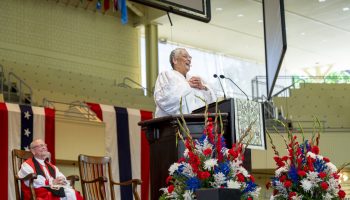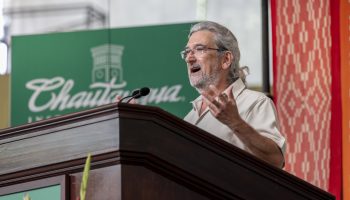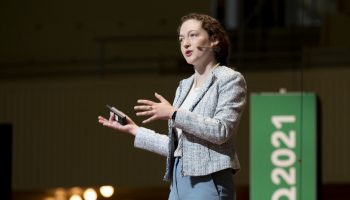
Every Sunday, Rabbi Jeffrey Salkin opens The New York Times and counts wedding announcements. It might not be a perfect scientific study or a full picture of reality, but he uses it as a wake-up call.
“On average, non-clergy, instant clergy and friends of the couples (officiate at) about 30-50% of all weddings, as recorded in the Sunday New York Times,” Salkin said.
Salkin pulled from his experiences speaking with non-religious Jews to explain why people leave organized religion — with a focus on Jewish nones — in his lecture, “Looking for God in All the Right Places: an Appeal to the ‘Nones,’” on Monday July 6, on CHQ Assembly. As an established writer on Judaism after completing 10 books, Salkin maintains a Religion News Service blog called “Martini Judaism: for those who want to be shaken and stirred” that explores ties between Judaism and culture.
The audience submitted questions that were addressed in a live Q-and-A after the lecture through questions.chq.org, or through Twitter with #CHQ2020.
The lecture was recorded on June 28 and was the first in the Interfaith Lecture Series for that platform’s Week Two theme, “Forces that Shape Our Daily Lives: The Contemporary Search for Spirituality” which follows the overarching “Forces Unseen: What Shapes Our Daily Lives” Week Two theme.
Salkin said he has nothing against civil ceremonies. But as a rabbi, the concept of a couple’s friends becoming ordained online through the Universal Life Church or through the Church of Jerry Garcia had bothered him.
“Those instant clergy raise in my mind the possibility that we are devaluing the meaning of theological education, at least for these private moments,” Salkin said. “I suspect that in many cases, though I have not attended them, those weddings might represent a loss of the sacred — that sense of inheritance, historical tradition that goes beyond the couple, beyond the moment and beyond that place.”
But Salkin’s son, who performed a wedding for his two ex-Catholic friends, helped changed his perspective on the matter. Salkin asked his son why he did it.
“Why shouldn’t I do the ceremony?” his son said. “They asked me as a friend. And why would they have clergy there? They’re not anything.”
Salkin said the number of Americans who align with Protestant, Catholic or Evangelical Christianity are declining in a steep decline that had occurred in an earlier shift in Europe. Judaism is falling behind as well, though not at such a steep rate. The Church of Latter-Day Saints is still growing but at a slower pace, while Islam and Orthodox Judaism are experiencing steady growth.
Salkin said “nones” are typically motivated to leave the religious institutions of their youth because they are frustrated by negative personal experiences, clergy misdeeds or politics in an institution. But he doesn’t hear anger from Jewish nones.
Salkin cited influential Jewish writer Abraham Joshua Heschel’s 1995 book, God in Search of Men, to explain this.
“It is customary to blame secular science and philosophy for the eclipse of religion in modern society. It would be more honest to blame religion for its own defeats,” Heschel wrote. “Religion declined not because it was refuted, but because it became irrelevant, dull, oppressive, insipid. When faith is completely replaced by creed, worship by discipline, love by habit; when the crisis of society is ignored because of the splendor of the past; when faith becomes an heirloom rather than a living fountain, when religion speaks only in the name of authority — rather than the voice of compassion — its message becomes meaningless.”
Salkin said the nones agree with this criticism. Messages from the synagogue need to be relevant to people’s values and issues in the world, including the current Black Lives Matter movement. Salkin said that as a fellow group with a long history of being persecuted, Jewish institutions and people should be sympathetic with the BLM movement.
Above all, Salkin said that the nones needed to be treated like more than a body in a pew and be taken seriously if synagogues hope for them to return.
“I can deal with anger,” Salkin said. “I can process anger. But what I hear is not anger. I hear disappointment.”




